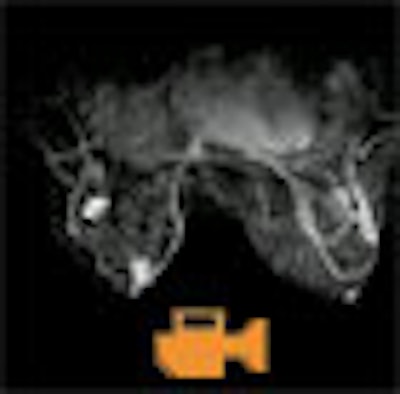
This North Andover, MA, developer of dedicated breast MRI systems will emphasize SpiralRODEO, a new image acquisition technique based on the company's RODEO (rotating delivery of excitation off-resonance) technology.
SpiralRODEO enables Aurora users to achieve gains in efficiency and signal-to-noise ratios, producing faster, clearer images, according to the company. The technique is based on a change in the way the Aurora system reconstructs imaging data: conventional 3D Fourier transform techniques fill the reconstruction space a line at a time, but SpiralRODEO fills the reconstruction space from the center and spiraling outward.
The technique enables the system to cover more of the reconstruction space in one projection than 3D Fourier transform techniques, according to Dr. Steven Harms, the University of Arkansas breast MRI specialist who worked with Aurora on the technique. As a result, the Aurora system is able to generate 512 x 512 images in 32 projections, versus 512 projections required on a system using a 3D Fourier transform method, Harms said. The technique also reduces scan times to 15 minutes from 20 minutes previously.
|
Having trouble viewing this clip? Click here to view full size clip or to change format. |
| This video shows Aurora's SpiralRODEO technology. |
SpiralRODEO is based on Aurora's precision gradients, which have been included on the 1.5-tesla system since it began shipping. The gradients produce less than 1 mm of distortion over 44 cm, and enable the Aurora system to handle rapid gradient switching with little distortion, Harms said.
From a clinical perspective, SpiralRODEO enables users to get more precise clinical images, enabling them to produce more confident diagnoses of pathologies like ductal carcinoma in situ (DCIS). For example, with SpiralRODEO users can visualize branching enhancements of DCIS that might appear as cloudy areas on conventional breast MRI, Harms said.
Aurora will be making SpiralRODEO available to new customers and installed systems in the field, and can upgrade existing systems by replacing their computers to enable them to handle the larger amounts of data the system produces.
SpiralRODEO is currently shipping in the U.S., and has been installed at two clinical sites, the company said.
By Brian Casey
AuntMinnie.com staff writer
November 1, 2006
Copyright © 2006 AuntMinnie.com


.fFmgij6Hin.png?auto=compress%2Cformat&fit=crop&h=100&q=70&w=100)





.fFmgij6Hin.png?auto=compress%2Cformat&fit=crop&h=167&q=70&w=250)











